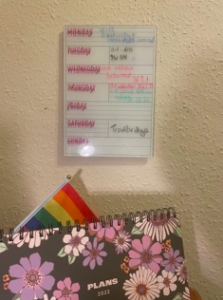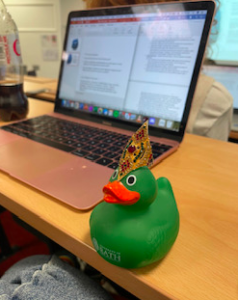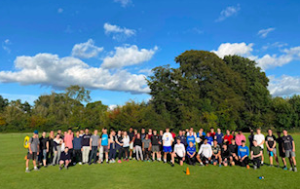Watch this video and then read on for more about my tips.
What is the point of university? We come to this place to get a degree, to make friends, have new experiences and potentially set ourselves on track for a lifelong career. This potential to get a lot out of university can make the experience of being at university itself… well… a lot.
This could be positive, but there’s always the chance for ‘a lot’ to turn into ‘too much’. And experiencing ‘too much’ could leave you feeling anxious, alone, and as though this whole endeavour was a waste of time.
Obviously, nobody wants to be feeling all of this whilst studying for a degree. This is where this blog post comes in. Hopefully, these tips will help prospective or fresh university students make their student life a more productive and personally fulfilling experience.
So here you go, my four top tips for surviving university life from the perspective of this final year psychology student.
Tip 1. Get more from doing less
 One of the top things you will be told about when looking around or joining any university is all the opportunities you will gain by going there. At most universities, students are given access to a wide range of different societies, spaces, volunteering and job opportunities. After all, universities pride themselves on having well-rounded students who have more than just their course going for them.
One of the top things you will be told about when looking around or joining any university is all the opportunities you will gain by going there. At most universities, students are given access to a wide range of different societies, spaces, volunteering and job opportunities. After all, universities pride themselves on having well-rounded students who have more than just their course going for them.
Having all these opportunities can be really amazing. Beginners courses are fantastic ways to pick up new skills and hobbies and meet a whole range of different people you may never have interacted with otherwise. It’s also likely if you’re already interested in an activity that you will be able to continue this during your degree.
Volunteering and job opportunities are great ways to apply what you’re learning in a more practical setting to gain extra work experience, money and fund a potentially expensive student lifestyle.
 However, having access to so many opportunities can leave you spreading yourself far too thin. Going for everything may seem like a really exciting and fun approach, but after a while, it's likely to be unfeasible to keep up with everything.
However, having access to so many opportunities can leave you spreading yourself far too thin. Going for everything may seem like a really exciting and fun approach, but after a while, it's likely to be unfeasible to keep up with everything.
Therefore I would highly recommend focusing on the activities that are the most worthwhile to you and dropping the rest. If you want to try out different beginner sessions or drop in for a practice shift then go for it, but once it comes to committing to something, do be careful with how much you commit to. After all, the fewer things you have to focus on, the more energy you have to focus on each thing you are doing.
So I suggest you reflect on who you are, what you want out of this experience and what you enjoy and go from there. Choose the activities you want to put your energy into and go with those. And if you end up not enjoying something, don’t feel pressured into staying in that negative situation. After all, university is about you: your degree, your time and your experiences. So it's important to spend your time and energy doing what you feel is best for you instead of doing everything.
Tip 2. De-stress your space
 One thing we really need to acknowledge more is just how big an impact the space around you can have on you. Our space can end up reflecting our moods if we let it. Then if you’re feeling stressed and your space reflects this stress, this could cause a negative cycle that leaves you feeling trapped.
One thing we really need to acknowledge more is just how big an impact the space around you can have on you. Our space can end up reflecting our moods if we let it. Then if you’re feeling stressed and your space reflects this stress, this could cause a negative cycle that leaves you feeling trapped.
It's important to de-stress your space, especially when you need to get things done. There are many different ways to do this. Cleaning your room and desk can leave you feeling accomplished and similarly motivated to use these spaces in a more productive way. De-stressing your space can also be accomplished by leaving a stressful environment and coming back to it with a new positive mindset.
For example, if you are feeling overwhelmed at university, it may be a good idea to visit home or another environment you find comfortable. Going into a space that is not reflective of the stress you’re experiencing can be beneficial for removing the pressure you felt and allowing you to then focus on what you need to get done. This is the reason many students will go home for exam seasons (also having your parents cook for you is always a plus!).
Then when you come back to this space having seen how it is possible for you to be productive, you can remake your previously stressful space into a space more reflective of possibilities, productivity and positivity. Decorating your space to make you feel comfortable can also be a great form of de-stressing your space. Having posters and prints and plants that make you feel good may ultimately encourage you to focus more when you’re in these self-decorated spaces and feel better about yourself and the work you produce within them.
Tip 3. Prioritise your time and energy
 Life as a university student is far less fixed in a set routine. Lectures can appear at random times and you’ll likely have lecture and assignment work to complete as well as whatever extracurriculars you have on. Therefore it’s important to prioritise your time and energy effectively so you can stay on top of everything and not burn out.
Life as a university student is far less fixed in a set routine. Lectures can appear at random times and you’ll likely have lecture and assignment work to complete as well as whatever extracurriculars you have on. Therefore it’s important to prioritise your time and energy effectively so you can stay on top of everything and not burn out.
Many students, myself included, use different forms of scheduling to set out what you will do and when. It may sound strange to schedule things that could seem more natural like taking time off to relax or hang out with friends, but this may also be important. If you have a long list of work to get done, you may feel pressure to complete this list before you can have any time to enjoy yourself.
However, when you start working your way down that list you’ll likely find yourself feeling drained and unmotivated. This is why it is crucial to schedule time off for yourself. After all, if you spend all your time focusing on activities and assignments, how will you have the energy left to do any more of these activities and assignments? Humans are like batteries and we really do require time to recharge, so be sure to do this.
As the semester progresses you may alter what you prioritise accordingly. Exam seasons at Bath are at the end of each semester, and the exams and assignments within this period are often weighed the most. Therefore it’s essential to take more time off during this period to focus on your studies and yourself. University societies are aware of this and tend to run fewer sessions around this time. However, if you are working or doing non-University related activities then it is important to communicate that you may need some more time off to focus on your exams or assignments during this period.
Tip 4. Push away the pressure
 Deadlines, coursework and exams. These three words typically trigger students and even activate our fight or flight responses. We spend the majority of our degree working on and towards these assignments with the hope of getting a good mark at the end. After all, many of us go into our courses with the hopes of getting a good degree that we can use to help us make it in the workplace.
Deadlines, coursework and exams. These three words typically trigger students and even activate our fight or flight responses. We spend the majority of our degree working on and towards these assignments with the hope of getting a good mark at the end. After all, many of us go into our courses with the hopes of getting a good degree that we can use to help us make it in the workplace.
This can cause students a lot of pressure. We feel this pressure from ourselves, from our coursemates when they talk about their own progress and from lecturers, who we hope not to let down. Pressure can be a good thing when it motivates us, but this pressure can also leave us feeling anxious, uncertain and unproductive.
 If you’re ever feeling like this, follow Doja Cat and 'say so'. If you’re feeling unable to function then it is really important to communicate this to those around you. Taking time for yourself if you’re feeling demotivated can also really help you feel better again. Then once you’ve reset, you’ll be more able to focus on these assignments and produce quality pieces of work.
If you’re ever feeling like this, follow Doja Cat and 'say so'. If you’re feeling unable to function then it is really important to communicate this to those around you. Taking time for yourself if you’re feeling demotivated can also really help you feel better again. Then once you’ve reset, you’ll be more able to focus on these assignments and produce quality pieces of work.
Speaking to friends, Student Services and Wellbeing are great ways of letting your anxieties be known. Communicating about a feeling validates its existence and also allows those around you to suggest methods of reducing this negativity. Allowing yourself the time to focus on activities that help clear your mind is also important.
This may include running, drawing or even watching a comfort show. Hanging out with friends, cooking together, watching shows or going on day trips could also help you feel more connected, loved and capable. You are worthy of feeling good about yourself and are also far more likely to achieve greatness if you feel you can. So take the time to find that state again and use these supportive resources available to you whenever you need them.
Remember, university is about you
You are the one getting this degree, you are the one experiencing this student life. You need to prioritise yourself first and foremost. Don’t be afraid of struggling, we all do, it’s a part of life. Instead, allow this struggle to help you find out more about how you cope with challenges and build yourself up. Use the resources you have, connect with the people you like and love and find what helps you thrive. Then hopefully your experience as a student will be ultimately incredible.
Use the resources you have, connect with the people you like and love and find what helps you thrive. Then hopefully your experience as a student will be ultimately incredible.
That’s all folks! I hope these tips may be helpful and leave a comment if you have any questions. 🙂 Finally, you can also watch my video
Respond





